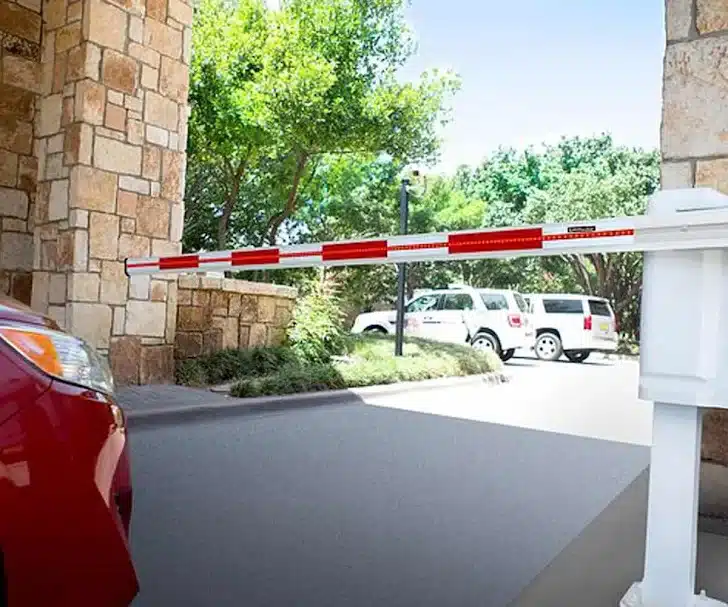Every property has its first line of defense. For some, it’s a tall fence. For others, it’s a security guard posted at the entrance. However, for many places, including toll roads, airports, parking garages, and corporate campuses, that first layer of protection is something most people barely notice: the barrier gate.
Here’s the thing, though: those gates don’t move on their own. Behind every arm going up and down is a You see them every day if you drive through toll booths, gated communities, industrial yards, or office complexes. They quietly manage traffic, keep things moving, and add a layer of security… until the day they stop working.
And when that happens, frustration kicks in. Cars back up. Truck drivers get annoyed. Security teams scramble. Suddenly, that simple “arm” you never noticed has become the most important thing in the world.
That’s why we’re here. To answer the big question: why should you consider upgrading to modern barrier gate operators?
Spoiler: because the new ones aren’t just stronger and smoother, they’re smarter. They don’t just move traffic; they actually help protect your property, streamline operations, and reduce headaches. Let’s break it down.
The Basics: What Exactly is a Barrier Gate Operator?
If you’re not knee-deep in the access control world, here’s the simple version: A barrier gate operator is basically the mechanical system that lifts and lowers the arm you see blocking vehicle entrances or exits.
They’re used everywhere:
- Highways at toll booths
- Industrial areas with heavy truck traffic
- Parking lots and garages
- Airports
- Corporate facilities
- Government buildings
The gate “arm” can be short for tight areas or really long for wider lanes (especially where trucks need extra space). These arms aren’t just aluminum poles either. The good ones are built tough, made to withstand rain, snow, blazing sun, and the occasional bumper tap from an impatient driver.
But here’s the thing: not all barrier operators are created equal. Old-school versions were clunky, slow, and, honestly, a pain to maintain. Modern systems? Totally different story.
Why Upgrade to a Modern Barrier Gate Operator?
Let’s get into the good stuff. What do the newer operators bring to the table that the older models just can’t?
1. Smooth Operation
Ever been stuck behind a gate that screeches up slowly like it hasn’t been oiled since the ‘90s? Modern operators run smoothly and quietly. No drama, no delay. Smooth operation keeps traffic moving and reduces wear on the equipment itself.
2. Vandalism Protection
It’s sad but true: barrier arms are tempting targets for vandalism. New operators come with built-in protection features that make them harder to tamper with and easier to secure when needed.
3. Traffic Light Logic
This is a big deal in high-volume areas. Barrier operators can now integrate with traffic lights, so vehicles move in a coordinated flow. Red means stop, and green means go. Simple, but incredibly effective at preventing chaos.
4. Auto-Reverse Features
You know those old gates that keep going down even if a car is still under them? Yeah, not great. Modern barrier gate operators come with auto-reverse features; if they sense something in the way, they reverse immediately. That saves cars from damage and saves you from liability headaches.
5. Manual Emergency Release
Power outage? System malfunction? No problem. Modern operators have manual release functions so you can quickly raise or lower the barrier in emergencies. That kind of flexibility is a lifesaver.
But It’s Not Just About Traffic: It’s About Security
Here’s where security barriers and gates come in. Upgrading isn’t just about getting smoother motion or smarter sensors. It’s about building a system that makes your facility harder to breach.
- Stronger arms deter forced entry.
- Integrated access control means only authorized vehicles get through.
- Crash-rated systems (for high-security areas) can stop vehicles dead in their tracks.
Think about it this way: your barrier gate is your property’s first line of defense. Would you rather it be an old, rusty arm that anyone can push past, or a modern, reinforced system that actually earns the name “security barrier”?
Manufacturers Who Are Pushing the Industry Forward
At R3 Access, we work with some of the top names in the industry . (We’re not the ones making these systems, but we connect you with the right solutions from the right people.) Two of the biggest players we’ve partnered with for years are FAAC and DoorKing.
FAAC: Innovation from Italy
FAAC has been in the game for more than 50 years. Based out of Bologna, Italy, they’re basically pioneers of automated gates. If you can imagine a type of automated access system, FAAC probably makes it.
What makes FAAC stand out?
- Hydraulic lift gate operators for heavy-duty jobs.
- Swing and slide gate operators for different layouts.
- Solar gate operators (yep, eco-friendly solutions).
- Barriers, bollards, and turnstiles for both cars and pedestrians.
They’ve got a global footprint and a reputation for innovation, but what we like most is their reliability. Their barrier operators aren’t just powerful; they’re built to handle the harshest conditions.
Check them out here: FAAC
DoorKing: Made for American Streets
DoorKing is another heavy hitter. They’ve been around for 75 years, and you’ll find their products just about everywhere in the U.S. From gated neighborhoods to hospitals to corporate parking lots, they’ve built a name on durability and innovation.
Here’s what makes DoorKing unique:
- Telephone entry systems (still the gold standard in many places).
- Cloud-based programmable access systems (super handy for big facilities).
- Slide, swing, and barrier gate operators for a variety of needs.
- Maximum security gate operators for the toughest environments.
They were also the first to use microprocessors and magnetic limits in operators, tech that’s basically an industry standard now.
Check them out here: DoorKing
Where You’ll Actually Notice the Difference
Let’s say you’re in charge of a toll booth on a busy highway. Hundreds of trucks pass through daily. An old gate operator struggles, slows down traffic, and breaks down every couple of months.
Now replace it with a modern operator:
- Arms move smoothly, no delays.
- Traffic flows better with light integration.
- Trucks don’t waste time (and fuel) idling.
- Security teams can rely on the gate to actually enforce rules.
Or picture a corporate office parking lot. Old gates mean frustrated employees honking in the morning. New gates mean seamless entry, less maintenance, and, honestly, happier people.
The Bottom Line
Upgrading to a modern barrier gate operator isn’t just a fancy tech upgrade; it’s a practical investment. You get:
- Better traffic flow.
- Stronger security.
- Less maintenance.
- More peace of mind.
If your facility is still relying on outdated systems, you’re basically leaving efficiency (and security) on the table.
Consider upgrading security barriers and gates now before the old system fails at the worst possible time.
Check out R3 Access barrier operators.
FAQs
1. What’s the difference between a barrier gate operator and a security barrier?
A barrier gate operator is the machine that controls the arm going up and down. A security barrier usually refers to a crash-rated or reinforced system designed to physically stop vehicles. They work together but aren’t the same thing.
2. Are modern barrier gate operators hard to install?
Not really. Most are designed for fairly straightforward installation. Plus, manufacturers like FAAC and DoorKing provide detailed support, specs, and training resources.
3. Can barrier gate operators integrate with access control systems?
Yes. The latest operators easily tie into card readers, keypads, RFID tags, and even cloud-based systems for total control.
4. How long do barrier gate operators usually last?
A good operator with a reliable brand name can easily have a lifespan of more than 10 years when used properly and well-maintained. And that being said, technology changes very quickly; the sooner the upgrades are carried out, the more likely it will run in a smooth, safer manner.
5. Do I need a heavy-duty model for my property?
It depends. In the case of a small residential lot, an ordinary operator is sufficient. However, in the industrial world, where there is truck traffic or a high-security area, you will need a long-arm, heavy-duty, or even crash-rated system.
Ready to explore your options?
Visit R3 Access and check out barrier operators from leaders like FAAC and DoorKing.
And hey, don’t forget to follow us on LinkedIn for updates, insights, and industry news.


